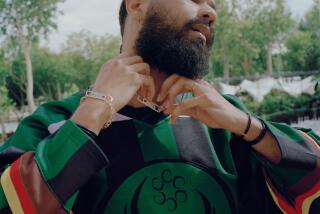Designer Azzedine Alaia, known for clingy style, dies at 77

- Share via
Reporting from Paris — Tunisian-born designer Azzedine Alaia, a fashion iconoclast whose clingy styles helped define the 1980s and who dressed famous women from Hollywood to the White House, has died at age 77.
The French Haute Couture Federation announced Alaia’s death on Saturday without providing details. Twitter tributes to his influence on fashion poured in from around the world.
Secretive and known as a fashion rebel, Alaia was based in Paris for decades but did not take part in the French capital’s seasonal fashion frenzy or flashy ad campaigns. Instead, he showed privately on his own schedule.
Alaia sometimes was dubbed the “king of cling” for the formfitting designs he first popularized during the 1980s and updated over the decades. Naomi Campbell was a favored model, and Michelle Obama wore his designs as U.S. first lady.
His house’s website described him as “the little man in eternal Chinese pajamas” who “built a legend, that of a rebel designer who worked against the system and its trends.”
Multiple museums have held retrospectives of Alaia’s work, including the Guggenheim in New York and Paris’ Palais Galliera, which put on a show in 2013 that highlighted his way of “slowing down time.”
“A genius who weaved connections among fashion, architecture and fine arts, sculpting creations to magnify women’s bodies. A free and generous man, loved and admired,” former French Culture Minister Audrey Azoulay, who recently became director of the United Nations cultural agency UNESCO, said in tribute to the designer.
Alaia was raised by his grandmother and earned a diploma at the Tunis Fine Arts Institute, according to his house’s website. He arrived in Paris in the 1950s, where he rented a room in a countess’ home in exchange for small jobs.
He learned to sew at Guy Laroche, worked briefly at Christian Dior and started his own house in 1980. He worked with superstars as well as low-cost retailer Tati, well before H&M popularized that kind of high-low cooperation with well-known designers.
Alaia received offers to take over other fashion houses, but he routinely refused. He sought financial support in the 1990s and kept his company going. It had revenue of 60 million euros last year.
No information was immediately available on survivors or memorial arrangements.
More to Read
Start your day right
Sign up for Essential California for the L.A. Times biggest news, features and recommendations in your inbox six days a week.
You may occasionally receive promotional content from the Los Angeles Times.






